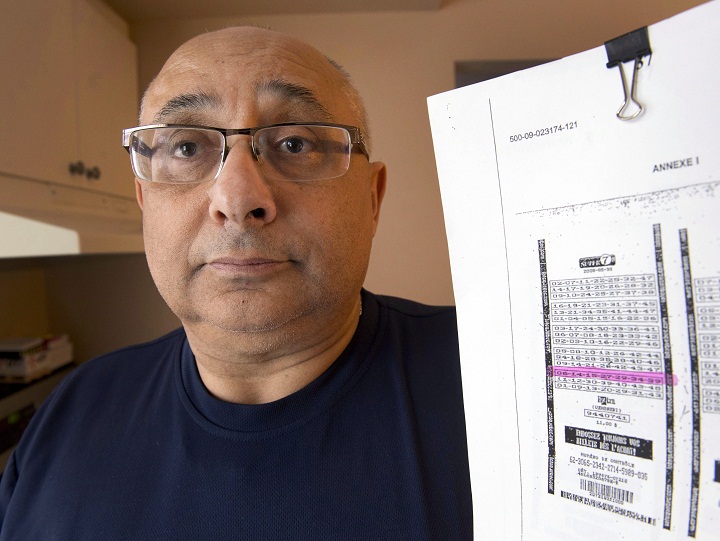MONTREAL – A Quebec man who once lost a $13.5 million lottery jackpot by seven seconds is now trying to launch a class-action suit against Loto-Quebec over quick pick lottery tickets.

Joel Ifergan filed a motion to Quebec Superior Court last Wednesday asking for authorization to begin a class-action lawsuit against the Crown corporation.
In the documents Ifergan alleges when someone purchases a ticket with randomly-generated numbers those combination of numbers are subsequently removed from the database of numbers available to buy.
The documents quote testimony by a Loto-Quebec executive from Ifergan’s previous court battle with the corporation.
Denis Daly said all the purchased random generated combinations are only put back into the system after three or four draws when the database is “re-shuffled.”
Ifergan alleges in the documents that this mean that millions of possibly winning combinations could be unavailable for those who do not select their own numbers and instead buy quick pick tickets by the end of several draws.
He hopes to be authorized to file a lawsuit on behalf of clients who purchased quick pick tickets sold by Lotto Max and its predecessor, Super 7, since 2005, with the possibility of expanding it to other lotteries.
Ifergan said as far as he knows, this system is not in place elsewhere in Canada, and it amounts to a disadvantage for Quebec clients who buy quick pick tickets with randomly assigned numbers, since the “missing” numbers could still be drawn as winners.
“The way it operates puts us the Quebec consumer at a disadvantage against not only consumers in the rest of Canada, but other Quebec consumers who pick their own numbers,” Ifergan told The Canadian Press.
- Life in the forest: How Stanley Park’s longest resident survived a changing landscape
- ‘Love at first sight’: Snow leopard at Toronto Zoo pregnant for 1st time
- Buzz kill? Gen Z less interested in coffee than older Canadians, survey shows
- Carbon rebate labelling in bank deposits fuelling confusion, minister says
Ifergan’s lawyer likens the system to “playing cards, but with a deck that isn’t complete.”
In an interview, David Bourgoin said the motion was based on consumer protection laws, and that the missing numbers constitute “an important fact” that Loto-Quebec did not disclose to buyers.
“Before they buy a ticket, (Loto-Quebec) should have to inform people that there’s a chance that they have no chance of winning,” he said.
The allegations contained in the documents have not been proven in court.
In an email, Loto-Quebec spokesman Patrice Lavoie said the corporation would not comment on the motion filed to “allow the legal process to follow its course.”
Nevertheless, he said Loto-Quebec had won a previous case along the same lines.
“Loto-Québec is confident of its position regarding the issue, as the Appeals Court and Superior Court have sided with the Corporation in a previous case based on the same allegations,” he wrote.
The class action, if authorized by the courts, would not be the first time Ifergan takes on Loto-Quebec in court.
On May 23, 2008, Ifergan bought a lottery ticket which turned out to have the winning numbers — but because it popped out of the terminal seven seconds after the 9 p.m. deadline, it was dated for the following week.
He argued that a delay in Loto-Quebec’s computer system caused a lag in the issuing of the ticket for that night’s 27-million jackpot, and that he should be entitled to half the prize, which was ultimately claimed by another person.
Ifergan lost in Quebec Superior Court in 2012 and the Quebec Court of Appeal in 2014. In January of this year, the Supreme Court of Canada ruled they wouldn’t hear his case.



Comments